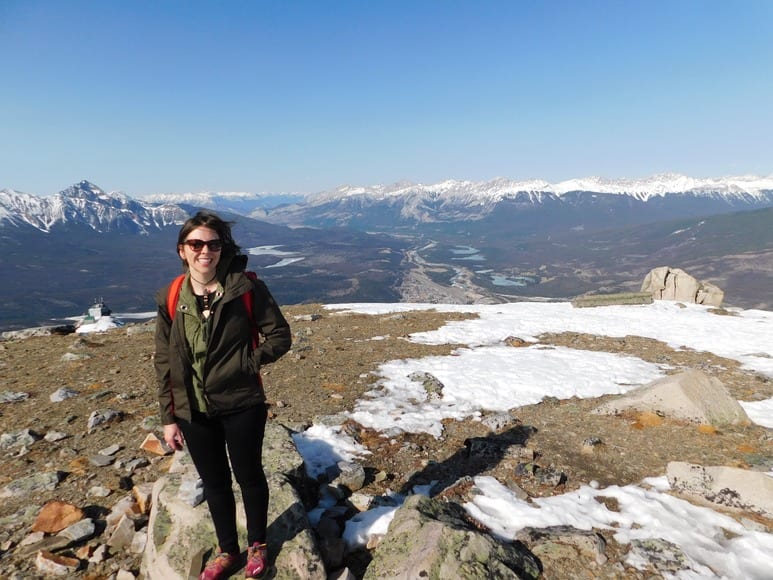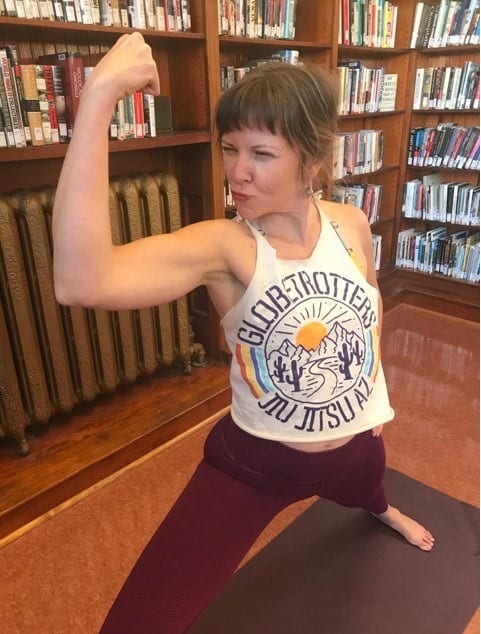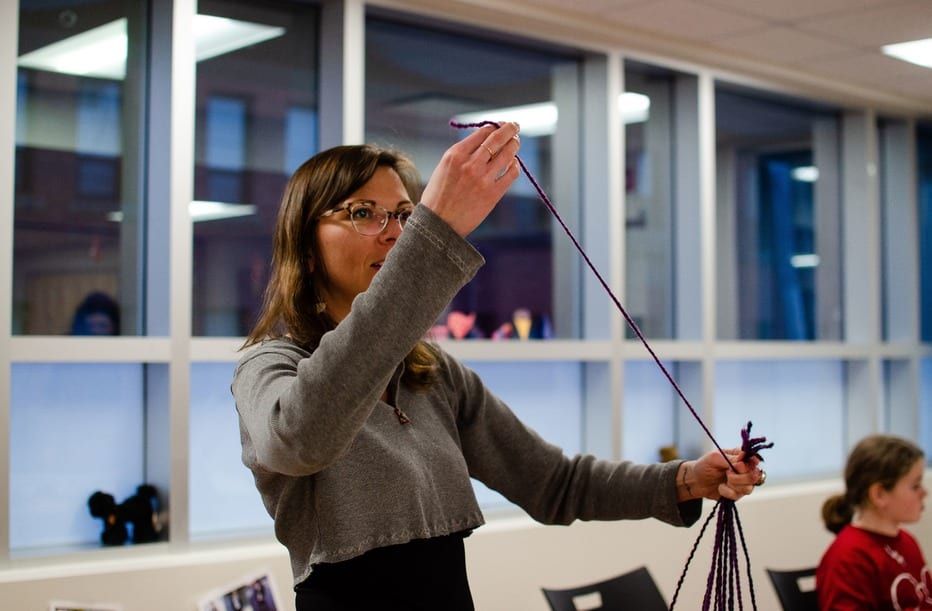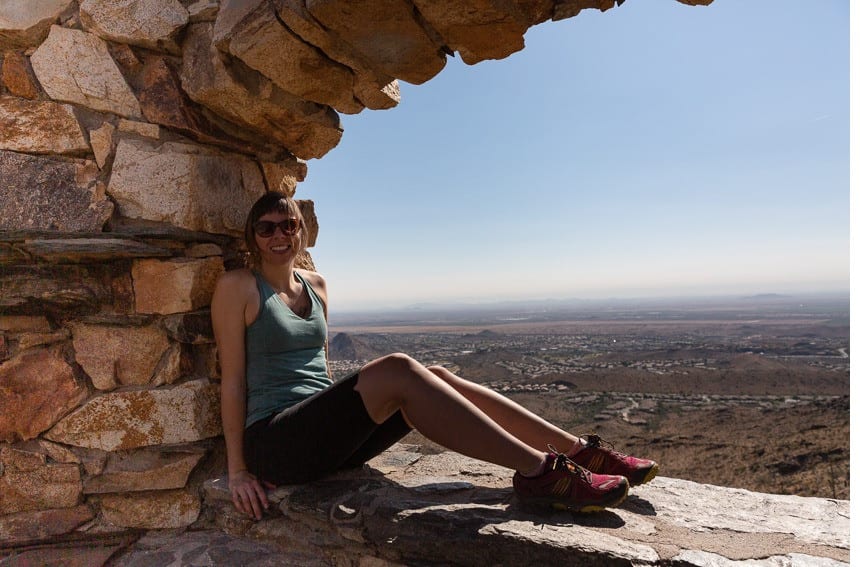Featured Traveller: Jenn Carson – Yoga teacher, librarian and author

Jenn Carson Yoga
Age: 38
Belt: Blue, with some stripes, if that matters
Profession: Library Director, Author, Yoga Teacher
How many years in BJJ: Three and a half-ish
Other martial arts: Yellow belt in kickboxing when I was in high school, does that count? I also belong to the Woodstock Boxing Club, but I’m fairly rubbish at it. Have you seen how skinny my arms are?
Where do you live: Woodstock, New Brunswick, Canada
Where are you originally from: Moncton, New Brunswick, Canada
Other fun or curious information you would like to share: I’m a physical literacy researcher. You can check out my work at Jenn Carson website www.jenncarson.com.

Tell us what inspired you to travel and train?
I travel to teach people about physical literacy and to improve my own. I live in a small town where there isn’t much opportunity to train Jiu Jitsu, so I travel to take seminars and experience different gyms’ cultures. Currently the nearest BJJ gym is an hour away, so I train with friends on borrowed mats in my basement. I like bringing the BJJ friends I make while I travel back to my small town to share their knowledge with the handful of training partners I have here. I share things I’ve picked up while I’m away, even though I probably forget 99% of it. I feel like Indiana Jones bringing home treasure and bruises.
Tell us about your most recent trip and your upcoming trips – where have you been and where are you going?
This is hard to talk about due to the pandemic. I’ve had to cancel all my travel plans, which I was really looking forward to. I was supposed to present at a writer’s conference in May, teach yoga at the Arizona and Maine Globetrotters camps (which will hopefully happen later in the year… if not, next year), possibly train in Ireland in the fall, go visit a Globetrotters friend in Reno, go see a bunch of cool concerts with my kids and friends (I’m a major music nerd), take my kids on an amazing adventure this summer in the Berkshires (mountain range in the Northeastern US), give a keynote presentation at a library conference out west… all of which likely won’t happen now. Not only have I lost money over this, the anticipatory magic has died. I feel guilty and indulgent for being sour, because I’m healthy, my kids are healthy, we have food and shelter, we are safe and loved. And I’m totally privileged to be able to even have that sort of itinerary in the first place. It’s not so bad, but it still sucks. I think it is okay to feel conflicting emotions at the same time.
My most recent trip, before they closed all the borders (even between Canadian provinces), was in early March. I went to try surfing – for the first time – in the Atlantic ocean off the coast of southern Nova Scotia, as it was hovering near zero celsius, during a nor’easter with five and six foot waves. In a holey wetsuit. I figure if you are going to try something new, the best time is under the most impossible, frustrating conditions, because each time after that will seem so much easier and more enjoyable. Like starting an open mat rolling with the most grizzly, show-offy, pent-up purple belt you can find. After that, getting your ass handed to you by a graceful black belt, or being patient with someone who is just learning, comes more naturally. It also really teaches you whether or not you like something or someone quickly. If you can enjoy a person or activity at their worst, you know you are invested for the long haul.

What are the things you enjoy about traveling?
At home I am very busy. I run an extremely active library, I participate in a number of sports, I am a single parent to two small children, I teach yoga and coach self-defense classes, I write books and do research, I grow a large garden and have chickens, etc… Travelling forces me to pause all that plate-spinning and just let myself focus on the task at hand: navigating a new environment. Ironically, I get a lot of good ideas for future research projects or artistic explorations when I slow down like that. So when I get home I have to be careful not to jump into seven new things to make me feel like I’m “making up for lost time” while I was gone.
Travelling also gives me a greater understanding, and therefore an increase in empathy, for how other people live. It also helps me appreciate what I have at home. I design and sew clothing for myself and my family, so I love seeing how people in different cultures dress. I love architecture and looking at buildings. I love being in different natural environments and learning about the flora and fauna. I can just look at things all day long.
Because my children are young and I don’t have a partner, I often travel alone. This is a wonderful break, because I don’t have to be responsible for anyone else for a few days, or even talk to anyone, except when ordering food, or at shops, or while training, or working (I often present at library conferences on the road). But mostly, I can just spend time looking and listening and… being. My nervous system takes a big sigh of relief. But I’m also very grateful to get home to “my people.” Introverts still need their humans.
Can you give us some examples of experiences you had that makes it worth traveling and training?
For the last few years at US Globetrotters camps, I have been the in-house yoga instructor. I’m also a positional therapist and will often give talks about that. I don’t go to a lot of the parties and social events around camp. I mostly show up, teach yoga, train all day, have fascinating one-on-one conversations, ask (probably annoyingly super-technical dumbass blue belt) questions, and then go back to wherever I’m staying (alone) to unwind from all the stimulation. People often approach me to help them with an injury, or to ask advice about their yoga or meditation practices. These connections last long after I come home from camp, as people continue to stay in touch through social media and keep me updated on their progress. I’m not the person at camp wearing an outlandish unitard or rallying everyone to do shots (but I appreciate the entertainment factor of those who do!). I feel like I offer a friendly, helpful, maybe even knowledgeable presence, and that makes me feel good about my work. And I benefit so much from everyone sharing their Jiu Jitsu knowledge with me. I like feeling physically and mentally full and exhausted at the end of camp – it is time well spent. And, of course, sharing knitting tips with Eric Bydairk.

Jenn Carson
What has so far been the most surprising experience for you when traveling?
I am normally a very conscientious packer and planner when travelling, but last year, on my way to a writing workshop on Deer Isle, Maine at Haystack Mountain School of Crafts, I did something really stupid. I stopped at a gas station about three quarters of the way on my four-hour journey to fill up. I was in the middle of the Maine woods heading for the coast. I went to grab my wallet to go inside to pay and realized…I didn’t have it. I had my passport, which is how I got through the US-CAN border crossing, but my wallet was nowhere to be found. I dug through my hatchback looking everywhere and then had a horrible sinking sensation as I saw in my mind’s eye how it was sitting on my windowsill at home, near the door, where I put it so I “wouldn’t forget it.” I didn’t know what I was going to do. I had no credit cards, no cell phone, no driver’s license, no health insurance card… nothing but two crumpled Canadian five dollar bills in my pocket, which wasn’t enough to pay for more than a couple packs of gum – if they’d even take my worthless foreign currency. I pictured myself selling ass on the side of a backwoods road to an old fisherman with no teeth and a smelly dog. I used my yoga breathing to calm my panic and that’s when I remembered I had a baggy of American change in the glovebox from camping trips with the boys. I dug it out and cried with relief to find eighteen dollars (!!!) of change. The boys always make fun of my “trash wallet”, but because I hate carrying change in my pockets every time we make a purchase in the US, I just throw the change in an old zip-top baggy and it has accumulated over the years. They were always mortified when I used it in stores. I ran inside and paid for my tank of gas with pennies and dimes and quarters. I had enough gas to either turn around and head back to Canada and retrieve my wallet (and be very late for my weeklong workshop) or else drive to the school but be stranded there with no gas to get home. I decided, as is my usual pattern, to do the hardest, most challenging thing. I figured I had an hour of driving ahead to formulate a plan.
When I arrived I immediately sought out the school’s office manager, explained my situation, and asked if there was a computer with internet access I could use and if it was acceptable to have a piece of mail sent to the office. She said it was, and told me, “Don’t worry, you aren’t stuck here, one way or the other we will get you home”. But I didn’t like the idea of accepting help from strangers. I didn’t want to be a burden on anyone and was deeply embarrassed of what I’d done. I ran to the school’s tiny library with its dial-up internet, to slowly log into Facebook and message my best friend – who was visiting his brother in upstate New York – and ask him to mail me some concealed cash and just hope it got to me in the middle of nowhere by the end of the week. He agreed. Luckily I’d prepaid my room and board using a credit card, so I didn’t need to worry about eating or accommodation. I could settle in and focus on writing poetry, which is why I was there. I didn’t even tell my roommate I was completely broke. When everyone went to town to visit galleries and farmer’s markets, I’d take long walks in the woods or swim in the frigid Atlantic.
Near the end of the week, there was a group exhibit for which we needed to buy supplies at the school’s store. I suggested alternatives to the project that did not cost anything, which was met by indifference from my classmates. So I quietly explained my situation to the professor and why I couldn’t participate in the group project. This was overheard by another classmate in the dining hall. The student said, “Is that why you haven’t signed up for the lobster dinner?” (a tradition at the school). I insisted that no, I just didn’t need a lobster, as I’m from the east coast and could get them at home. He told me he was buying me one. I balked and argued. He laughed and signed me up anyway. Again, I didn’t want to be a burden on strangers, but he wanted to help and he needed me to let him. He told me stories of losing his wallet or passport while travelling in foreign countries and how other people had helped him. It was a moment of shared humanity. He said, “I like how you are flawed but also not afraid to still be a challenging human.” My professor told me to buy anything I wanted at the supply shop, and if I needed anything else during my stay to let him know. I silently vowed to mail them both a thank-you present (and cash) when I returned to Canada (which I did). Every day I checked the office anxiously to see if the mail arrived, and it finally did near the end of the week, with enough American money to get me home, and also buy me some lunch on the way. I was overjoyed with relief. It was enlightening to watch how uncomfortable depending on others made me.
My roommate, who was supposed to leave a day early, decided to change her plans and was worried about how she was going to make it to the airport since her ride was no longer available. I told her it was no problem, I’d drop her off at the airport on my way back to Canada. She was so happy and thankful, she told me she’d pay for my gas and lunch on the way in return. I was incredulous. Here I was, in the middle of the woods, with no wallet, and now I suddenly had more money that I’d ever need to get back home, with a lobster dinner in my lap, all because I’d taken a chance that it would all work out and I’d figure it out as I went. I was shaken by how deeply generous and caring humans can be, and how – like Christian Graugart often remarks – a stranger might just be a friend I hadn’t met yet. It renewed my trust in humanity. And gave me a deep lesson about how perfectionism is overrated. People still like me even when I fail. It’s okay to make mistakes.
Are you a budget traveller – and if so how do you plan for a cheap trip?
I guess it depends on your idea of “cheap.” When I fly somewhere I rarely rent a car; I usually walk, bike, or take public transportation. I do this because it is cheaper, it is better for the environment (to help offset my guilt from flying), and because it lets me see more of the local culture. I also like the challenge of figuring things out at street level, especially when I don’t speak the local language. I also hate navigating traffic in unknown places. Other people’s driving terrifies me. I often stay in hostels or rent rooms from people, rather than in hotels – again because it is cheaper, but also because I get more of a feel for the place. A generic chain hotel looks the same almost everywhere. I rarely shop when I travel, except for unusual art supplies, books, or interesting things for my kids or friends. I try to find a local seamstress or fashion designer and purchase one piece from them. That is sometimes my most extravagant cost, besides the flight. But I have built a very interesting and exotic wardrobe because of it. It feels like visual storytelling when I get dressed, knowing where all the articles came from, who made them, and how I felt when I bought them.
If you were to pass on travel advice to your fellow Globetrotters, what would it be?
Just once, to challenge yourself, try travelling without a cell phone. I don’t have one, and never have, and so it makes for a really wonderful and sometimes maddening experience trying to navigate the world without technology in your hand. But it is also amazing, because it forces you to really be present when you talk to people, to rely on them for help and kindness, and it takes you out of your self-absorbed, seemingly self-reliant bubble. You appreciate how interconnected we all are. And you look up and see things you would miss if you were staring at a phone. It also means I don’t take pictures when I travel. My memory becomes my camera. I have to really look at your beautiful face so I remember it. I have to pay attention because I’ll never get to live in this moment again.

A big thanks to Jenn Carson!











